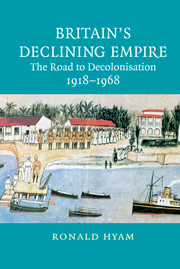Book contents
- Frontmatter
- Contents
- List of illustrations
- Maps
- Preface
- List of abbreviations
- Introduction
- 1 ‘The whole world is rocking’: British governments and a dysfunctional imperial system, 1918–1945
- 2 ‘British imperialism is dead’: the Attlee government and the end of empire, 1945–1951
- 3 ‘Rugged and tangled difficulties’: the Churchill and Eden governments and the end of empire, 1951–1956
- 4 ‘The wind of change is blowing’: the Macmillan and Douglas-Home governments and the end of empire,1957–1964
- 5 'We could no longer afford to honour our pledges': the Wilson government and the end of empire, 1964–1968
- Epilogue
- Appendix
- Select bibliography
- Index
4 - ‘The wind of change is blowing’: the Macmillan and Douglas-Home governments and the end of empire,1957–1964
Published online by Cambridge University Press: 05 June 2014
- Frontmatter
- Contents
- List of illustrations
- Maps
- Preface
- List of abbreviations
- Introduction
- 1 ‘The whole world is rocking’: British governments and a dysfunctional imperial system, 1918–1945
- 2 ‘British imperialism is dead’: the Attlee government and the end of empire, 1945–1951
- 3 ‘Rugged and tangled difficulties’: the Churchill and Eden governments and the end of empire, 1951–1956
- 4 ‘The wind of change is blowing’: the Macmillan and Douglas-Home governments and the end of empire,1957–1964
- 5 'We could no longer afford to honour our pledges': the Wilson government and the end of empire, 1964–1968
- Epilogue
- Appendix
- Select bibliography
- Index
Summary
Once, changing trains at Baker Street, Attlee had been asked by a woman, ‘have you ever been told you look just like Mr Attlee?’ ‘Frequently’, he replied, laconically in character. Such a thing could never have happened to Harold Macmillan. ‘SuperMac’, having been a head-turningly handsome schoolboy, developed an unmistakably old-world patrician presence blended with the media-consciousness of a consummate stage-actor. He had style, he had wit, and he had them in abdundance – though this is not to say he entirely avoided resort to banality, bluff, and bad history. The important thing was that he had learned how to command attention. As a minister, he had frequently demonstrated panache, and a mastery of the Cabinet memorandum as a minor art-form, incisive, witty and jaundiced at the same time. No-one but Macmillan would have dared to quote Stanley Holloway's comic monologue ‘Albert and the lion’ in a paper about the traitors Burgess and Maclean (‘Sum one ‘ad got to be summoned, so that was decided upon’). When chairing Cabinet meetings, it amused him to use analogies from the shooting-field which he knew nine-tenths of ministers would not understand. Unlike Eden, his abilities – wide knowledge of affairs and insight, professionalism, and administrative capacity – genuinely marked him out as a politician worthy of the top job. Underneath the ‘unflappable’ image, however, Macmillan was an agitated worrier, a specialist in worst-case scenarios. Also, he could be ridiculously pompous.
- Type
- Chapter
- Information
- Britain's Declining EmpireThe Road to Decolonisation, 1918–1968, pp. 241 - 326Publisher: Cambridge University PressPrint publication year: 2007



